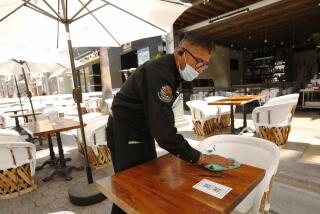Riots Are Latest Blow to Nation’s Small Businesses : Economy: The current slump continues to take a heavy toll on the sector.
- Share via
NEW YORK — The destruction or damage to perhaps 10,000 businesses during the Los Angeles riot--most of them small businesses--couldn’t have occurred at a more ironic time.
This week is “small business week” in the United States.
At least 3,000 of those Los Angeles businesses may not reopen, observers say.
Across the nation, the small-business community has been hit hard by the recession.
Bankruptcies are still on the rise. Hiring is down. The pace of new-business formation is off substantially compared to previous recoveries.
Moreover, the main concerns of small businesses--soaring health care costs for employees, government red tape, the need for bank credit and tax relief--have yet to be fully addressed by the major presidential candidates, small-business experts say.
“The small-business sector is very weak right now,” says an economist with Bear Stearns & Co., an investment house. “Since the first quarter of 1991, new business formations in the U.S., including smaller firms, are up about 5%. But that pace is only about half the rate of increase for business formations in a typical economic recovery.”
That is unhappy news, considering that small businesses are the linchpin of the economic system. “Some 58% of the entire private work force in the U.S. is employed by small businesses of 100 people or less,” says Terry Hill, a spokesman for the National Federation of Independent Business (NFIB) in Washington. All told, there are some 5 million small businesses that employ workers; another 5 million firms are individual proprietorships, Hill says.
Some economists estimate that there are as many as 20 million small businesses. Many unincorporated small-business owners file personal, rather than corporate, income tax returns, and are thus difficult to track.
Whatever the number, the economic impact of small businesses is enormous. Total annual sales of companies with 500 or fewer employees exceed $4 trillion, according to the Department of Commerce. That represents a little over half of the sales of all firms with employees.
Small businesses are still the main generators of jobs. In recent years, large firms such as IBM and General Motors, as well as entire business sectors--including banking, insurance and financial services--have laid off thousands of workers. But according to Bear Stearns, between 1982 and 1986, the small-business sector created 14.2 million jobs in new businesses; another 4.5 million jobs were added in existing small businesses.
On Long Island alone, 2,800 businesses started up last year.
Beginning in the late 1980s, small businesses were hit hard by changing economic circumstances. Many entrepreneurs were unable to get access to capital because of intense competition for credit from corporations involved in mergers and buyouts.
Then came the recession. Since early 1990, business failures have outpaced business formations. Dun & Bradstreet estimates that new-business in corporations increased 2.2% between October, 1990, and October, 1991, but business failures shot up 40%.
Small businesses are not expected to do much hiring the next few months. According to a recent NFIB survey, 20% of the firms surveyed say they plan to expand employment during the months ahead, but 7% will reduce employment. These are the “worst March figures since 1986,” when monthly data were first collected, according to William Dunkelberg, chief economist for the NFIB.
Still, the March survey finds that small-business owners are slightly more optimistic about the recovery than in February.
“This is a very tough economy for small-business owners,” says Rieva Lesonsky, editor in chief of the Entrepreneur Group, which includes Entrepreneur Magazine.
More to Read
Inside the business of entertainment
The Wide Shot brings you news, analysis and insights on everything from streaming wars to production — and what it all means for the future.
You may occasionally receive promotional content from the Los Angeles Times.










